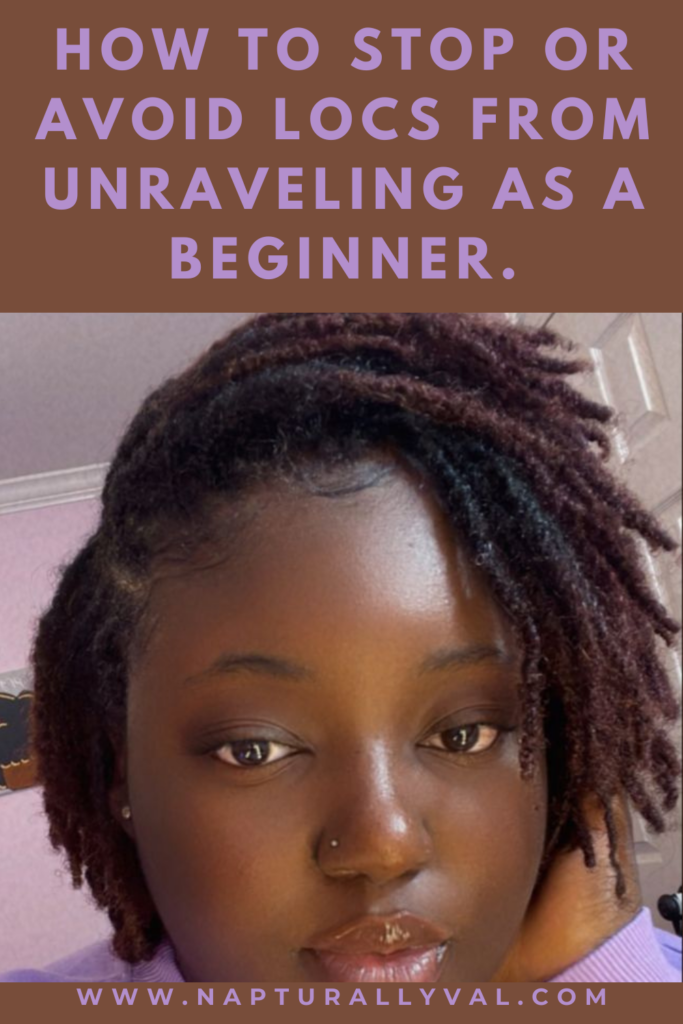Starting your loc journey is an exciting experience, but one common challenge beginners face is keeping their locs from unraveling. Whether you’ve just started with comb coils, two-strand twists, or another method, unravelling can be frustrating—but don’t worry, it’s a natural part of the process for many. With the right techniques, products, and patience, you can help your locs stay intact and thrive. Here’s a detailed guide to preventing and addressing unraveling during the early stages of your loc journey.
Feel like your hair has been the same length forever, I’ve an Ebook that will help you grow your hair healthier, longer and thicker. Grab your copy here… Also, check out all the Ebooks,guides and journals that will go a long way in your hair care journey here.

Table of Contents
Why Do Locs Unravel?
Understanding why unraveling happens can help you address it effectively. Here are the most common reasons:
- Hair Texture: If your hair texture is naturally soft, fine, or straight, it might take longer to lock. These textures are less prone to tangling, which is essential for loc formation.
- Starter Method: Some loc starting methods, like comb coils or finger coils, are more likely to unravel, especially when exposed to water or manipulation.
- Moisture Exposure: Washing your hair or excessive sweating can loosen the foundation of your locs, causing unraveling.
- Frequent Manipulation: Touching, twisting, or pulling on your starter locs can prevent them from settling and locking properly.
- Short Hair Length: Shorter hair can be more prone to unraveling since there’s less hair to anchor the locs.
Now that we know the causes, let’s dive into actionable tips to prevent and stop unraveling.

Loc Unraveling? Try These 10 Pro Tips for Stronger Hold
1. Choose the Right Starter Method for Your Hair Type
The loc method you choose plays a significant role in how well your locs hold in the beginning. Some methods are more secure than others, depending on your hair texture.
- Comb Coils: Best for tightly coiled hair (Type 4). These are more prone to unraveling but lock quickly with proper care.
- Two-Strand Twists: Suitable for all textures, especially those with looser curls. Twists are more stable than coils and less likely to unravel.
- Braids/Plaits: Ideal for straight or loosely curled hair. Braids take longer to lock but are highly resistant to unraveling.
- Interlocking: A great option for straight or fine hair, as it provides a strong foundation that’s less likely to come undone.
Pro Tip: Consult a loctician to determine the best method for your hair type and lifestyle.
2. Minimize Water Exposure Early On
While keeping your scalp clean is essential, frequent washing in the early stages can lead to unraveling. Water softens the hair and can loosen the foundation of your starter locs.
Tips for Managing Water Exposure:
- Wash Infrequently: Limit washing to once every 3-4 weeks during the first few months.
- Use a Stocking Cap: Place a mesh or stocking cap over your locs while washing to keep them intact. This allows your scalp to be cleaned without disrupting the locs.
- Dry Thoroughly: After washing, ensure your locs are completely dry. Damp locs are more likely to unravel.
Pro Tip: For itchy scalps between washes, use a scalp reliever oil or spray.
3. Protect Your Locs While Sleeping
Tossing and turning at night can cause friction that loosens your locs, especially at the roots. Establishing a nighttime routine is key to preventing unraveling.
Nighttime Protection Tips:
- Wear a Satin or Silk Scarf/Bonnet: Wrap your hair securely in a satin or silk scarf to minimize friction.
- Use a Satin Pillowcase: If scarves tend to slip off, a satin pillowcase provides an extra layer of protection.
- Avoid Tight Styles: Don’t tie your hair too tightly before bed, as this can strain the roots and cause discomfort.

4. Retwist Strategically
Retwisting helps keep your locs neat and reinforces the locking process, but overdoing it can weaken your hair.
Retwisting Tips for Beginners:
- Frequency: Retwist every 4-6 weeks, depending on how quickly your hair grows. Avoid retwisting too often, as it can cause thinning and breakage.
- Technique: Use a lightweight loc gel or aloe vera gel to retwist. Twist in the same direction each time to maintain uniformity.
- Set the Twist: After retwisting, secure the loc with a clip until it dries completely to hold the shape.
Pro Tip: Avoid using heavy waxes, as they can cause buildup and attract lint.
5. Moisturize Without Overdoing It
Hydration is essential for healthy locs, but too much moisture early on can loosen your locs. Striking the right balance is key.
How to Moisturize Starter Locs:
- Use a Light Mist: Spray your locs with a water-based moisturizer or rose water 2-3 times a week.
- Seal in Moisture: Follow up with a small amount of lightweight oil, like jojoba or argan oil, to lock in hydration.
- Focus on the Scalp: Avoid applying too much product to the loc itself, especially in the early stages.
6. Separate Locs Regularly
Locs can start to combine or “marry” at the roots if not separated. Regularly separating them ensures each loc stays distinct.
How to Separate Locs:
- After Washing: Gently pull apart locs that are starting to tangle together.
- Use Oil for Ease: Apply a light oil to your fingers to reduce friction while separating.
- Be Gentle: If locs are tightly tangled, take your time to avoid breakage.
7. Avoid Over-Manipulation
Constantly touching, twisting, or styling your starter locs can prevent them from locking properly. Let your locs settle by keeping manipulation to a minimum.
Tips for Reducing Manipulation:
- Low-Manipulation Styles: Try simple styles like buns, ponytails, or headwraps that don’t require frequent adjustment.
- Hands-Off Approach: Resist the urge to twist or twirl your locs throughout the day.
- Patience is Key: Remember, the locking process takes time. Trust the journey and avoid rushing the process.
8. Use Products Wisely
The wrong products can weigh down your locs and cause them to unravel. Choose products specifically designed for locs.
Products to Use:
- Lightweight Loc Gel: Provides hold for retwisting without buildup.
- Clarifying Shampoo: Keeps locs clean without leaving residue.
- Natural Oils: Hydrate your scalp and locs without clogging pores.
Products to Avoid:
- Heavy Creams or Waxes: These can cause buildup and make locs feel sticky.
- Conditioners: Creamy conditioners can soften locs too much, leading to unraveling.

9. Protect Locs During Exercise or Swimming
Sweating or swimming can loosen starter locs, so it’s important to take precautions.
Exercise Tips:
- Wear a sweatband or wrap to absorb sweat and keep locs in place.
- Rinse your scalp lightly after workouts to remove salt buildup from sweat.
Swimming Tips:
- Use a swim cap to keep locs dry while swimming.
- Rinse locs with clean water immediately after swimming in chlorine or saltwater.
10. Be Patient and Trust the Process
Unraveling is a normal part of the early loc journey for many people. Remember, locs take time to mature, and each person’s hair locks at its own pace.
Encouragement for Beginners:
- Celebrate small milestones, like seeing your locs bud for the first time.
- Document your journey with photos to see how far you’ve come.
- Remember, your loc journey is unique, and the process is just as beautiful as the result.

Final Thoughts
Preventing unraveling in the early stages of your loc journey is all about patience, proper care, and a little bit of creativity. By choosing the right starter method, maintaining a consistent routine, and embracing the natural changes, you’ll set your locs up for long-term success.
With time, your locs will grow stronger and more defined, becoming a true reflection of your journey and personal style. Trust the process, and enjoy every twist, turn, and coil along the way!



